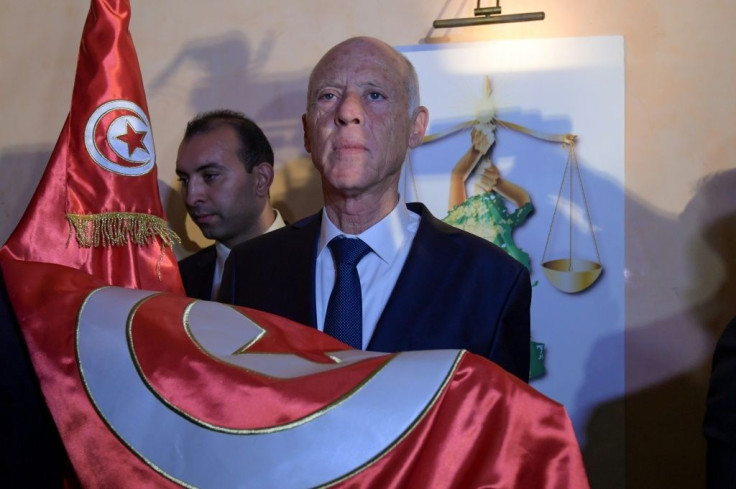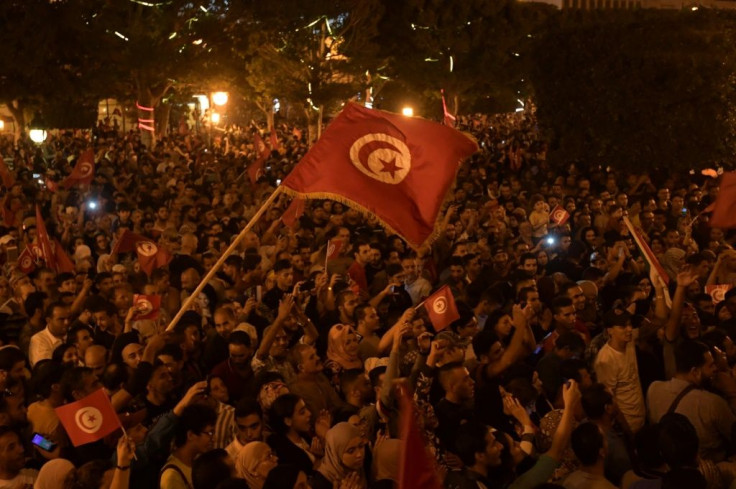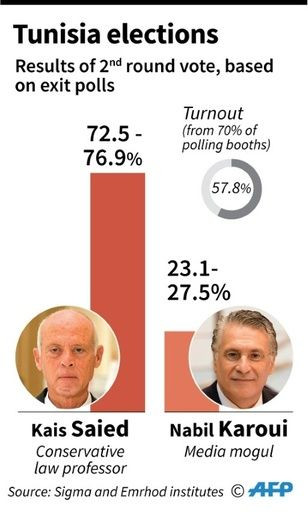Saied Elected Tunisia President On Tide Of Youth Vote

The electoral commission announced Monday that voters gave conservative political outsider Kais Saied a sweeping mandate to be Tunisia's next president, thanks largely to young people who flocked to his side.
In a contest that reflected Tunisia's shifting post-revolution political landscape, Saied, an independent, scooped 72.71 percent of votes in Sunday's runoff.
Saied garnered 2.7 million votes against one million for his rival, charismatic business tycoon Nabil Karoui, the commission said.
"He was elected very comfortably," political scientist Selim Kharrat said.
This win "is a message to parliament," Kharrat added. "Voters have opted for a plan to clean up politics, fight corruption, and give more power to local entities."
The vote reflected Tunisia's shifting political landscape since the 2011 Arab Spring uprising that ousted an autocratic regime.
Saied, a retired law professor with a rigid and austere demeanour that earned him the nickname "Robocop", was swept to victory on a tide of support from young voters, wooed by his anti-establishment platform.

Around 90 percent of 18- to 25-year-olds voted for Saied, according to estimates by the Sigma polling institute, compared with 49.2 percent of voters over 60.
Under Tunisian law, the results can be appealed within two weeks before the new president is sworn in at the end of the month.
The electoral commission ISIE said turnout was 55 percent, higher than the first round contested on September 15.
Saied, a 61-year-old constitutional law expert, campaigned on the values of the revolution of eight years ago, based on opposition to Westernised and corrupt elites, and in favour of radical decentralisation.

Tunisia's second free presidential election since its revolt followed president Beji Caid Essebsi's death in July. Elected in Tunisia's last presidential poll held in 2014, Essebsi had said he would not run for a second term.
'Turning a new page'
In his first reaction on Sunday as exit polls showed he was the clear victor, Saied thanked the country's young people "for turning a new page" and vowed to try to build "a new Tunisia".
Thousands of people took to the streets of the capital Tunis to celebrate Saied's victory, honking horns and singing the national anthem.
"Kais Saied, voice of the people," a gathered crowd chanted. "Long live Tunisia!"

The runoff pitted Saied against another newcomer, businessman Karoui, who has been dubbed Tunisia's "Berlusconi".
On Monday, Karoui congratulated Saied and promised him the support of his Qalb Tounes party, which came second in October 6 parliamentary elections after the Islamist-inspired Ennahdha party.
Karoui had been jailed for the majority of the campaign, only walking free on Wednesday after more than a month behind bars on suspicion of money-laundering. He has dismissed the charges as politically motivated.
Saied and Karoui both trounced the old guard in last month's first round, highlighting voter anger over a stagnant economy, joblessness and poor public services in the cradle of the Arab Spring.
The country's high unemployment rate disproportionately affected young graduates, fuelling their calls for political change.
"Tunisians were looking for integrity," said newly elected conservative lawmaker Lotfi Mraihi who won a seat in legislative polls held on October 6 that also swept aside the old guard.
He said Saied embodied "the will to cut ties with the old system and to revive the hope raised by the revolution" that toppled longtime autocrat Zine El Abidine Ben Ali, who died in exile in Saudi Arabia on September 19.
Sharp contrast
French President Emmanuel Macron congratulated Saied on his victory, as he hailed in a statement "the democratic mobilisation of Tunisia's citizens".
Tunisians took to social media voicing pride in a successful democratic process, a view also shared by political analysts.
"Congratulations to Tunisia... for showing a continued commitment to resolving differences via peaceful transitions," tweeted H.A. Hellyer, a senior fellow at the Royal United Services Institute in London.
But some analysts said the North African country was still facing "uncertainty".
"Nobody knows how Kais Saied will use his great legitimacy that embodies the popular will for change at a time when the politically fragmented country needs inclusion, good relations with the international community and pragmatism," said Michael Ayari, an analyst with the Crisis Group.
While the candidates were both seen as anti-establishment figures, the contrast between them was sharp.
Karoui presented himself as a candidate for the poor whose appeal stemmed largely from his media empire and philanthropic activity.
© Copyright AFP 2024. All rights reserved.





















